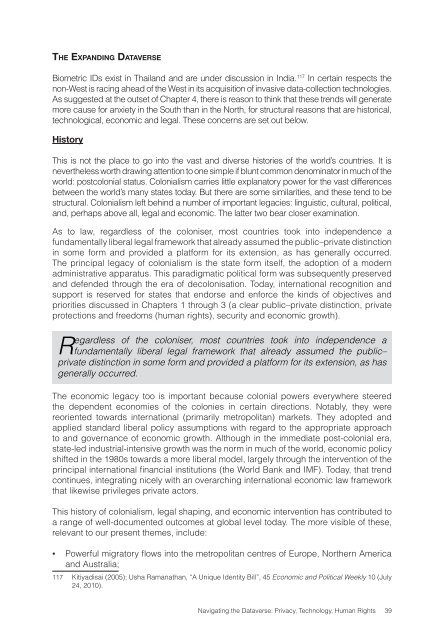Navigating the Dataverse: Privacy, Technology ... - The ICHRP
Navigating the Dataverse: Privacy, Technology ... - The ICHRP
Navigating the Dataverse: Privacy, Technology ... - The ICHRP
You also want an ePaper? Increase the reach of your titles
YUMPU automatically turns print PDFs into web optimized ePapers that Google loves.
<strong>The</strong> Expanding <strong>Dataverse</strong><br />
Biometric IDs exist in Thailand and are under discussion in India. 117 In certain respects <strong>the</strong><br />
non-West is racing ahead of <strong>the</strong> West in its acquisition of invasive data-collection technologies.<br />
As suggested at <strong>the</strong> outset of Chapter 4, <strong>the</strong>re is reason to think that <strong>the</strong>se trends will generate<br />
more cause for anxiety in <strong>the</strong> South than in <strong>the</strong> North, for structural reasons that are historical,<br />
technological, economic and legal. <strong>The</strong>se concerns are set out below.<br />
History<br />
This is not <strong>the</strong> place to go into <strong>the</strong> vast and diverse histories of <strong>the</strong> world’s countries. It is<br />
never<strong>the</strong>less worth drawing attention to one simple if blunt common denominator in much of <strong>the</strong><br />
world: postcolonial status. Colonialism carries little explanatory power for <strong>the</strong> vast differences<br />
between <strong>the</strong> world’s many states today. But <strong>the</strong>re are some similarities, and <strong>the</strong>se tend to be<br />
structural. Colonialism left behind a number of important legacies: linguistic, cultural, political,<br />
and, perhaps above all, legal and economic. <strong>The</strong> latter two bear closer examination.<br />
As to law, regardless of <strong>the</strong> coloniser, most countries took into independence a<br />
fundamentally liberal legal framework that already assumed <strong>the</strong> public–private distinction<br />
in some form and provided a platform for its extension, as has generally occurred.<br />
<strong>The</strong> principal legacy of colonialism is <strong>the</strong> state form itself, <strong>the</strong> adoption of a modern<br />
administrative apparatus. This paradigmatic political form was subsequently preserved<br />
and defended through <strong>the</strong> era of decolonisation. Today, international recognition and<br />
support is reserved for states that endorse and enforce <strong>the</strong> kinds of objectives and<br />
priorities discussed in Chapters 1 through 3 (a clear public–private distinction, private<br />
protections and freedoms (human rights), security and economic growth).<br />
Regardless of <strong>the</strong> coloniser, most countries took into independence a<br />
fundamentally liberal legal framework that already assumed <strong>the</strong> public–<br />
private distinction in some form and provided a platform for its extension, as has<br />
generally occurred.<br />
<strong>The</strong> economic legacy too is important because colonial powers everywhere steered<br />
<strong>the</strong> dependent economies of <strong>the</strong> colonies in certain directions. Notably, <strong>the</strong>y were<br />
reoriented towards international (primarily metropolitan) markets. <strong>The</strong>y adopted and<br />
applied standard liberal policy assumptions with regard to <strong>the</strong> appropriate approach<br />
to and governance of economic growth. Although in <strong>the</strong> immediate post-colonial era,<br />
state-led industrial-intensive growth was <strong>the</strong> norm in much of <strong>the</strong> world, economic policy<br />
shifted in <strong>the</strong> 1980s towards a more liberal model, largely through <strong>the</strong> intervention of <strong>the</strong><br />
principal international financial institutions (<strong>the</strong> World Bank and IMF). Today, that trend<br />
continues, integrating nicely with an overarching international economic law framework<br />
that likewise privileges private actors.<br />
This history of colonialism, legal shaping, and economic intervention has contributed to<br />
a range of well-documented outcomes at global level today. <strong>The</strong> more visible of <strong>the</strong>se,<br />
relevant to our present <strong>the</strong>mes, include:<br />
▪<br />
Powerful migratory flows into <strong>the</strong> metropolitan centres of Europe, Nor<strong>the</strong>rn America<br />
and Australia;<br />
117 Kitiyadisai (2005); Usha Ramanathan, “A Unique Identity Bill”, 45 Economic and Political Weekly 10 (July<br />
24, 2010).<br />
<strong>Navigating</strong> <strong>the</strong> <strong>Dataverse</strong>: <strong>Privacy</strong>, <strong>Technology</strong>, Human Rights 39
















